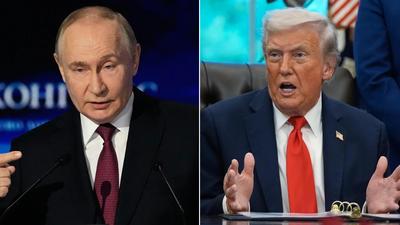In a decisive move escalating pressure on Moscow, the United States has imposed stringent sanctions on major Russian oil companies, demanding an immediate ceasefire amid ongoing conflict. This development comes as President Vladimir Putin remains steadfast in his refusal to halt military operations, according to reports from the Times of India. The latest sanctions aim to cripple Russia’s energy sector, intensifying economic strain while signaling Washington’s call for an urgent end to hostilities.
US Imposes Sanctions on Leading Russian Oil Companies Targeting Economic Pressure
The US administration has announced stringent sanctions targeting the backbone of Russia’s oil industry in a decisive effort to ramp up economic pressure. This bold move comes as Russian President Vladimir Putin maintains a staunch refusal to halt ongoing hostilities. The sanctions specifically focus on major state-owned enterprises and private firms pivotal to Russia’s energy exports, aiming to disrupt revenue streams that fuel the military campaign. These measures include freezing assets, restricting financial transactions, and prohibiting American companies from engaging in trade with the designated entities.
Key sectors affected by the sanctions include:
- Exploration and production companies heavily involved in crude oil extraction
- Refineries and petrochemical firms responsible for processing and distributing oil products
- Service providers such as shipping and insurance companies supporting oil logistics
To illustrate the scope of the sanctions, here is a simplified breakdown of the principal targets:
| Company | Industry Role | Sanction Type |
|---|---|---|
| Rosneft | Oil Extraction & Refining | Asset Freeze & Trade Prohibition |
| Lukoil | Exploration and Oil Logistics | Transaction Restrictions |
| Gazprom Neft | Production & Export Services | Financial Sanctions |
Analysis of Putin’s Stance and Its Impact on Conflict Resolution Efforts
President Putin’s current posture presents significant hurdles to ongoing conflict resolution dialogues. His unequivocal refusal to consider a ceasefire, despite escalating economic pressures, underscores a strategic calculus prioritizing territorial gains over diplomatic compromise. This stance not only hardens Moscow’s negotiating position but also complicates efforts by international mediators seeking to find common ground. The imposition of sanctions by the US targeting major Russian oil firms aims to undercut economic resources fueling the conflict; yet, the response from the Kremlin signals a firm commitment to maintain its operational momentum. Analysts suggest that without shifts in this fundamental position, prospects for a sustainable peace settlement will remain elusive.
- Economic Impact: Sanctions strain revenue streams, pressuring both state and private actors within Russia.
- Diplomatic Isolation: The sanctions reflect growing international consensus, isolating Russia on multiple fronts.
- Strategic Entrenchment: Putin’s stance signals prioritization of military objectives over economic or political costs.
| Impact Area | Recent Developments | Potential Consequences |
|---|---|---|
| Energy Sector | Sanctions on key oil firms | Revenue decline, increased domestic control |
| Diplomatic Relations | Heightened tensions with the West | Restricted negotiation leverage |
| Conflict Dynamics | No indication of ceasefire acceptance | Prolonged hostilities, increased casualties |
International Calls for Immediate Ceasefire Amid Escalating Tensions
Global leaders and international organizations have stepped up their calls for an immediate ceasefire after Russia’s latest refusal to halt military operations intensified the conflict. Diplomats from the United States, European Union, and United Nations have condemned the ongoing violence, emphasizing the urgent need to protect civilian lives and restore stability in the region. The coordinated imposition of sanctions, including the recent US move to target major Russian oil companies, highlights the growing international resolve to pressure Moscow into reconsidering its stance.
The new sanctions aim to curtail Russia’s economic capabilities by targeting key energy export sectors, thereby weakening financial resources critical to sustaining military engagement. Below is a summary of the principal sanctions targets announced:
| Sanction Type | Targeted Entities | Impact |
|---|---|---|
| Energy Sector Sanctions | Major Russian Oil Firms | Restricted access to global markets and financing |
| Financial Restrictions | State-owned Banks & Allies | Freezing of assets and transaction bans |
| Export Controls | High-Tech and Military Goods | Limiting supplies critical for defense production |
While these measures signify a strategic escalation in diplomatic pressure, international observers stress that dialogue remains essential to achieving a sustainable peace agreement. The consequences of continued conflict resonate far beyond the immediate region, underscoring the global stake in an expedited resolution.
Strategic Recommendations for Diplomatic Engagement and Sanctions Enforcement
To enhance the effectiveness of diplomatic efforts and sanctions enforcement, a multi-faceted approach is crucial. Prioritizing direct communication channels between key stakeholders can foster dialogue and reduce misunderstandings. Diplomats must leverage backchannels alongside public negotiations to maintain pressure while keeping avenues for compromise open. Strengthening the role of international organizations such as the United Nations and the Organization for Security and Co-operation in Europe (OSCE) will also be instrumental in monitoring ceasefire agreements and verifying compliance.
On the sanctions front, coordination among allied nations must be reinforced to prevent circumvention by state and non-state actors. This includes tightening financial controls, targeting intermediaries facilitating oil exports, and enhancing intelligence-sharing mechanisms. The following table highlights critical areas for focused action:
| Area | Strategic Focus | Expected Outcome |
|---|---|---|
| Energy Sector | Disrupt oil supply chains; impose transaction monitoring | Reduced revenue fueling conflict |
| Financial Networks | Expand sanctions to include secondary actors | Minimized capital flow to sanctioned entities |
| Diplomatic Channels | Facilitate multilateral mediation efforts | Increased chances of negotiated ceasefire |
| Intelligence Sharing | Real-time information exchange among allies | Improved enforcement and detection |
- Consistent message delivery: Avoid mixed signals by coordinating public statements.
- Legal frameworks: Enhance international legal tools to support enforcement.
- Humanitarian considerations: Ensure sanctions do not exacerbate civilian suffering.
Wrapping Up
As tensions escalate and geopolitical stakes rise, the United States’ imposition of sanctions on major Russian oil firms marks a decisive effort to pressure Moscow into halting its military actions. The call for an immediate ceasefire underscores the urgency felt by the international community in the face of ongoing conflict. How Russia responds to these measures will likely shape the next chapter in global diplomacy and security.




